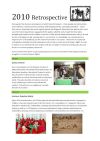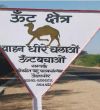2010 retrospective for livestock keepers

“It has been an amazing year for livestock keepers”, says LPP’s Ilse Koehler-Rollefson. “They have fought for their rights, all with the aim of bringing one big message across: our knowledge, our commitment, are important for rural livelihoods, for the environment and for consumers.”
Read her summary of the year’s events.
The cow is no climate-killer
Die Kuh ist kein Klima-Killer
Wie die Agrarindustrie die Erde verwüstet und was wir dagegen tun können
Anita Idel, 2010.
Metropolis Verlag für Ökonomie, Marburg. In German.
Cows belch methane – a greenhouse gas 25 times more powerful than carbon dioxide. Concerns about a changing climate have led many to call for curbs on cattle and other ruminants such as sheep, goats and buffaloes.
This book by LPP member Anita Idel argues that cattle and other livestock are vital for food production and to use land that cannot be cultivated. But they must be managed in the right way. Feeding them with intensively cultivated maize and soybean indeed harms the climate: synthetic fertilizers require a lot of energy and release nitrous oxide – a greenhouse gas that is 295 times more potent than carbon dioxide.
This book looks at the relationships between the soil, vegetation and animals. It argues that all depends on the sustainable grazing management of the livestock. Allowing them to graze on pasture converts vegetation into meat and milk, protects and enriches the soil, and minimizes the production of extra greenhouse gases.
An English version of the book is planned for 2011.
Summary (in English)
Saving the camels of Rajasthan

LPP’s partner in India, Lokhit Pashu-Palak Sansthan, has launched the Camel Conservation and Livelihoods Project. This aims to show that the conservation of animal genentic resources can go hand-in-hand with rural income generation and create jobs not only for the livestock keepers, but also for other rural people. The project aims specifically to serve widows in isolated desert villages who process camel wool.
The project is still at the beginning, but it opens up exciting vistas about how conservation can be integrated into other rural development activities and thereby more or less pay for itself.
It also shows the importance of collaboration with a wide range of other actors: in this case designers and technical experts are crucial.
“We believe that this approach has wide applicability”, says LPP’s Ilse Koehler-Rollefson. “It contextualizes indigenous breeds within the major policy debates (climate change, food security, poverty alleviation, etc.) and thereby turns breed conservation from its ‘niche activity’ status into a fundamental strategy for addressing these issues.”
“We would be glad to hear from anybody interested in this approach”, adds Ilse.
Contact her at ilse@pastoralpeoples.org
Download the project brochure.
- Go to the previous page
- 1
- …
- 37
- 38
- 39
- 40
- 41
- 42
- 43
- …
- 83
- Go to the next page
